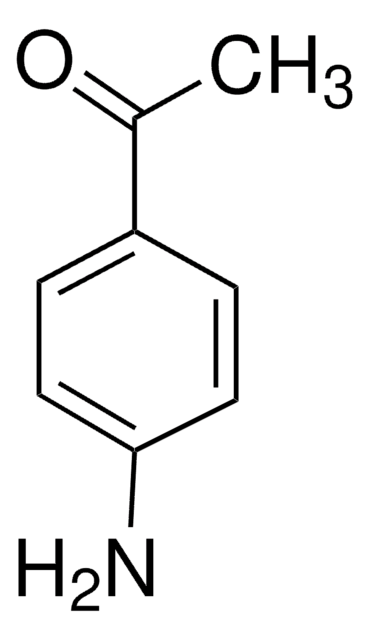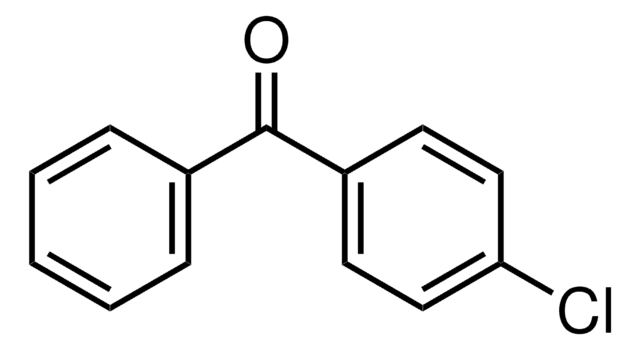All Photos(2)
About This Item
Linear Formula:
H2NC6H4CONH2
CAS Number:
Molecular Weight:
136.15
EC Number:
MDL number:
UNSPSC Code:
12352100
PubChem Substance ID:
NACRES:
NA.22
Recommended Products
Quality Level
Assay
98%
form
solid
mp
181-183 °C (lit.)
functional group
amide
SMILES string
NC(=O)c1ccc(N)cc1
InChI
1S/C7H8N2O/c8-6-3-1-5(2-4-6)7(9)10/h1-4H,8H2,(H2,9,10)
InChI key
QIKYZXDTTPVVAC-UHFFFAOYSA-N
Related Categories
Application
4-Aminobenzamide was used as a poly(ADP-ribose)polymerase (PADPRP) inhhibitor to study the death of target cells by cytotoxic effector cells using the nuclear enzyme poly(ADP-ribose)polymerase (PADPRP).
Signal Word
Warning
Hazard Statements
Precautionary Statements
Hazard Classifications
Eye Irrit. 2 - STOT SE 3
Target Organs
Respiratory system
Storage Class Code
11 - Combustible Solids
WGK
WGK 1
Personal Protective Equipment
dust mask type N95 (US), Eyeshields, Gloves
Choose from one of the most recent versions:
Certificates of Analysis (COA)
Lot/Batch Number
Don't see the Right Version?
If you require a particular version, you can look up a specific certificate by the Lot or Batch number.
Already Own This Product?
Find documentation for the products that you have recently purchased in the Document Library.
Customers Also Viewed
P Burgman et al.
Radiation research, 116(3), 406-415 (1988-12-01)
The purpose of this study was to investigate a possible involvement of poly(ADP-ribosyl)ation reactions in hyperthermic cell killing and hyperthermic DNA strand-break induction and repair in HeLa S3 cells. The inhibitors of poly(ADP-ribose) polymerase, 3-aminobenzamide (3AB) and 4-aminobenzamide (4AB), were
D Monti et al.
Biochemical and biophysical research communications, 199(2), 525-530 (1994-03-15)
The death of target cells by cytotoxic effector cells is a relevant biological phenomenon, where cells are activated and a very quick apoptotic program occurs. In order to test the hypothesis that the nuclear enzyme poly(ADP-ribose)polymerase (PADPRP) plays a role
Jamie Lajiness et al.
Medicinal chemistry (Shariqah (United Arab Emirates)), 5(3), 216-226 (2009-05-16)
Imidazole and pyrrole-containing polyamides belong to an important class of compounds that can be designed to target specific DNA sequences, and they are potentially useful in applications of controlling gene expression. The extent of polyamide curvature is an important consideration
E Ben-Hur et al.
Radiation research, 97(3), 546-555 (1984-03-01)
Postirradiation incubation of V79 Chinese hamster cells with inhibitors of poly(ADP-ribose) synthesis was found to potentiate the killing of cells by X rays. Potentiation increased with incubation time and with concentration of the inhibitor. Preirradiation incubation had only a small
S D Ray et al.
Molecular and cellular biochemistry, 218(1-2), 27-33 (2001-05-02)
Previous studies from our laboratories have linked the protective abilities of IH636 grape seed proanthocyanidin extract (GSPE) with inactivation of anti-apoptotic gene bcl-XL, and modification of several other critical molecular targets such as DNA-damage/DNA-repair, lipid peroxidation and intracellular Ca2+ homeostasis.
Our team of scientists has experience in all areas of research including Life Science, Material Science, Chemical Synthesis, Chromatography, Analytical and many others.
Contact Technical Service














